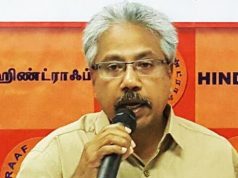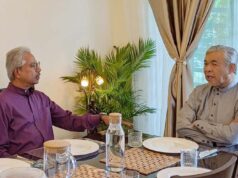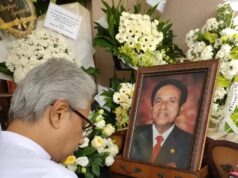COMMENT…
Terence Netto
Feb 14, 2013- Few would be able to deduce the real reason for the seeming impasse over the talks between the Hindu Rights Action Force (Hindraf) and Pakatan Rakyat as referenced yesterday by their national secretary P Ramesh from remarks made by him on the matter.
One has to examine his remarks, as reported by Malaysiakini, in some depth before coming to the critical bit – nicely couched in circumlocution – which has had the similar effect of a bone stuck in Pakatan’s proverbial throat.After lamenting the “inordinate delay” by Pakatan in endorsing the Hindraf blueprint for the Indian poor, Ramesh lets on that there is also the matter of an “electoral pact with Hindraf” that is also awaiting Pakatan’s concurrence.
Hitherto, no details about the pact have been shed in the public domain by either party in regards to the talks. These have not had the publicity that details of the Hindraf blueprint for the Indian poor which were received in the public arena.
No doubt, the need for discretion must have been the motive behind both parties’ silence on the pact’s ingredients, but given the salience of this aspect of the talks and their potential for engendering deadlock, the quiescence has been extraordinary.
Hindraf has demanded of Pakatan, as a condition for their support of the opposition coalition in the 13th general election, that the movement be given the right to contest for seven parliamentary and 10 state seats.
The parliamentary seats that the Hindu rights movement has asked for are Telok Kemang, Tapah, Kapar, Padang Serai (all PKR), Cameron Highlands, Segamat and Batu Kawan (all DAP).
Whereas, the state seats asked for are Bukit Melawati, Seri Andalas, Seri Setia, Jeram Padang, Port Dickson, Bukit Selambau (all PKR), Buntong, Prai, Tanah Rata and Tiram (all DAP).


Hindraf deals a shocking blow to Pakatan
Pakatan were stunned by these demands made by Hindraf when both sides got down to brass tacks after the latter’s leader, P Waythamoorthy, met with Pakatan supremo Anwar Ibrahim early last November.
Waythamoorthy (left), in contrast to his brother P Uthayakumar – who was always interested in the acquisition of parliamentary clout – had given the impression that as a social movement, Hindraf was more interested in fighting for its agenda for the Indian poor than in political representation.
So when talks began after Waythamoorthy’s meeting with Anwar was done with, and Pakatan were apprised of the demand for seven parliamentary and 10 state seats by Hindraf, they were treated to a rude surprise.
On the demand for the seats itself, the talks were effectively dead in the water.
Pakatan, whose principal interlocutor for the talks with Hindraf was PKR, could neither privately acquiesce to Hindraf’s seat demands, nor publicly announce that the talks had reached a stalemate.
Meanwhile, the Home Ministry’s announcement in January about the lifting of the five-year-ban on Hindraf, no doubt had the effect of emboldening Hindraf in their negotiating stance vis-à-vis Pakatan.


Now with Hindraf secretary Ramesh serving notice to Pakatan that the latter is being “inordinately” tardy in conceding the movement’s demands, the stage is set for an engagement between Najib and Hindraf.
This is the ineluctable option of a movement that, from the start, has always taken a quasi-separatist position on the whole issue of the Indian poor – the hawking of their wares to the highest bidder among the competing parties in the political arena.
It’s a poor position to take, because it prioritises expedience above principle and sectarian interests over national ones.










